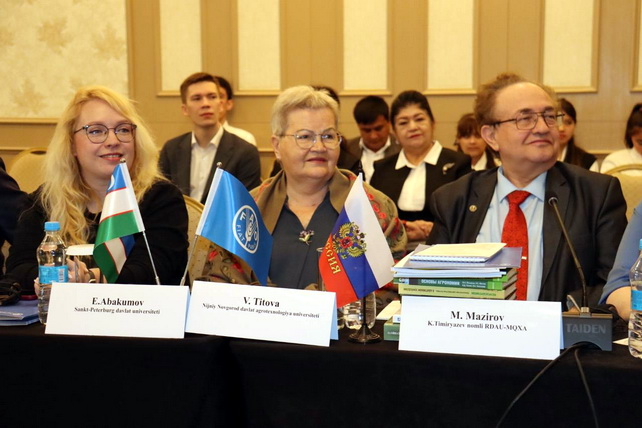
International scientific and practical conference on environmental protection held in Tashkent
International scientific and practical conference on environmental protection held in Tashkent
Tashkent, Uzbekistan (UzDaily.com) — As part of the Earth Day events, an International Scientific and Practical Conference was held in the capital of Uzbekistan, focusing on "Innovative Technologies in Environmental Protection, Climate Change, and the Improvement of Degraded Soils."
Earth Day, officially recognized by the UN on 22 April 2009, serves as an annual reminder to humanity of the need to treat the planet with care and to maintain ecological balance for sustainable development.
The event was organized by the Senate of the Oliy Majlis of the Republic of Uzbekistan, the Legislative Chamber, relevant ministries and agencies, including the Ministry of Ecology, Environmental Protection, and Climate Change, the Ministry of Higher Education, Science, and Innovations, the Academy of Sciences, as well as international and national organizations, including the FAO Representation in Uzbekistan and other partners.
Legal Framework and Current Challenges
During the conference, participants discussed pressing environmental issues and the legal framework regulating environmental protection. Data was presented indicating that 7–8 million hectares of fertile land are degraded worldwide each year. In several regions of Uzbekistan, the level of humus has decreased by 40–50%, negatively impacting soil biological activity.
Key state documents defining the country's environmental strategy were highlighted, including:
Presidential Decree No. PF-5863 (October 4, 2019) — "On the Approval of the Concept of Environmental Protection until 2030"
Resolution No. PP-277 (June 10, 2022) — "On Measures to Create an Effective System for Combating Land Degradation"
Presidential Decree No. PF-81 (May 31, 2023) — "On Measures for the Transformation of the Environmental and Environmental Protection Spheres"
Scientific Approaches and International Dialogue
The conference brought together leading scientists and experts from various countries. Proposals were made on the following priority areas:
The use of digital technologies and monitoring systems to combat soil degradation
The introduction of sustainable land management practices within the framework of a "green economy"
Transition to organic and carbon-neutral agriculture
Promotion of resource-saving agricultural technologies
Special attention was given to ensuring food security and the rational use of each hectare of land as a key direction in the 2030 sustainable development strategy.
Practical Implementation of Initiatives
On the second and third days of the conference, field seminars and demonstrations were held in Tashkent and Jizzakh regions. As part of the national project "Green Space," fruit trees — walnut, pistachio, and almond — were planted on degraded lands.
A competition was held among young scientists for the best scientific work, and thematic exhibitions were organized, focusing on resource-saving technologies and methods to enhance soil fertility.
Results and Recommendations
Key proposals from the conference included:
Development of a soil degradation monitoring system and digitization of the land cadastre
Use of internationally recognized indicators of land degradation neutrality
Implementation of environmentally safe and water-saving fertilization methods
Support for farmers and dehkan in adopting sustainable agricultural technologies
Creation of carbon-neutral farming models considering climate change
International Earth Day has been celebrated annually on 22 April since 1970. In a resolution adopted by the UN General Assembly at the initiative of the President of the 63rd session, Miguel d’Escoto Brockmann, the importance of preserving the planet and its ecosystems as the common home of humanity is emphasized. This requires maintaining harmony between economic, social, and environmental interests for both present and future generations.